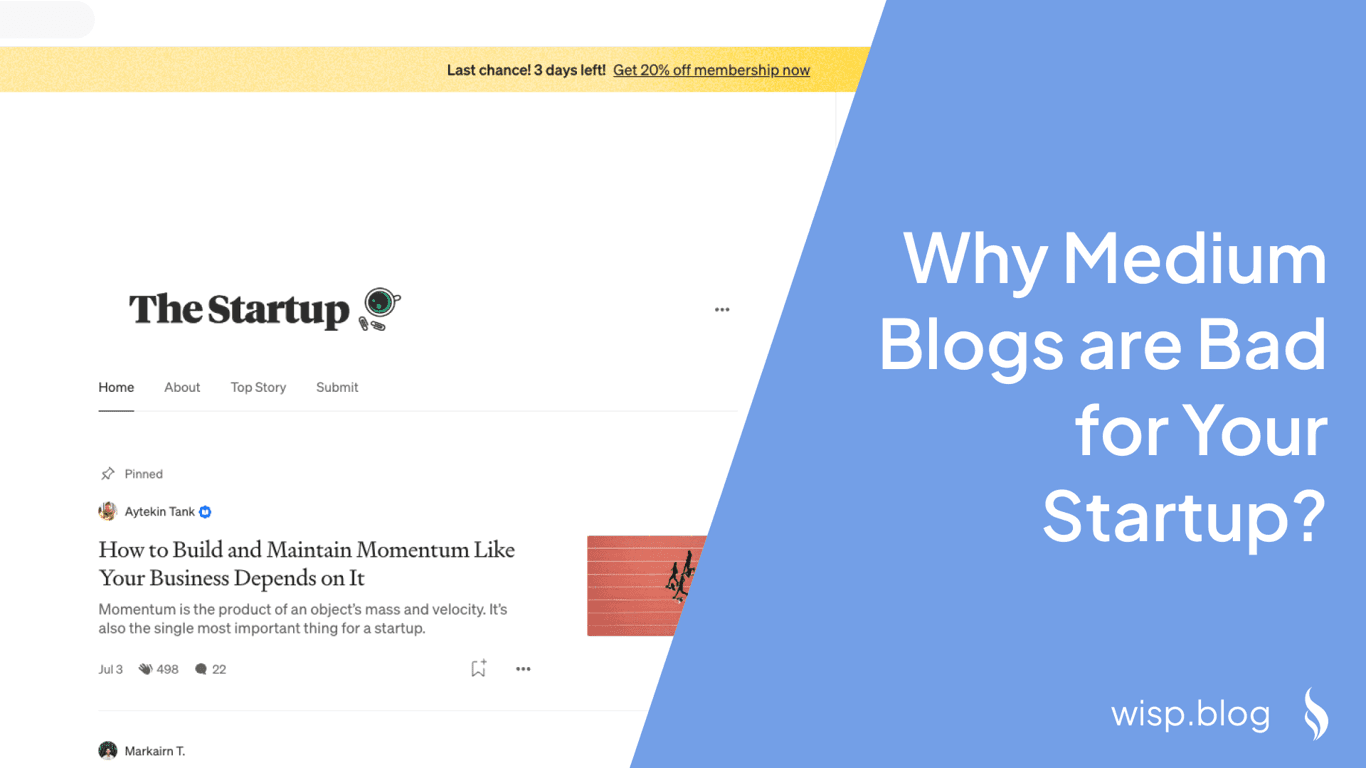
Introduction
Establishing a strong online presence in the competitive world of startup is crucial. One of the most effective ways to achieve this is by adding a blog to your startup's website. Not only does a blog offer numerous benefits in terms of visibility and engagement, but it also positions your startup as a thought leader in your industry. In this article, we will explore the various reasons why you should consider adding a blog to your startup website and provide practical steps to get started. Additionally, we will briefly introduce how Wisp CMS can simplify the blogging process for startups.
Benefits of Blogging for Startups

Attracts Organic Traffic
Regardless of the niche your startup belongs to, blogging continues to be one of the most important aspects of content marketing. According to a study by HubSpot, businesses that blog receive 55% more website visitors than those that don't. Blogging drives organic traffic to your website by targeting relevant keywords and topics that your potential customers are searching for. Startups that post blogs frequently tend to build an audience much quicker, as regular content updates keep your site fresh and attractive to search engines.
Improves Search Engine Rankings
Search engine optimization (SEO) is integral to the success of any startup's online strategy, and blogging is a powerful tool to enhance your SEO efforts. High-quality blog posts that adhere to the latest SEO standards can help your website rank higher on search engine result pages (SERPs). This increased visibility can lead to more organic traffic. A study by TechClient revealed that websites with blogs have 434% more indexed pages, which significantly boosts their chances of ranking higher in search results.
Engages Audience
Blogging is one of the best ways to boost engagement on your website. Interactive content such as contests, giveaways, and comment sections can turn passive readers into active participants. For example, a simple product giveaway can generate buzz and drive traffic to your site. Moreover, user-generated content, such as customer reviews and blog comments, provides valuable feedback and fosters a community around your brand.
Establishes Thought Leadership
Consistently publishing high-quality, informative content can establish your startup as a thought leader in your industry. Customers trust experts and prefer buying from brands that offer solutions rather than generic information. For instance, Moz, a company specializing in SEO, built its authority through comprehensive and educational blog posts that addressed common industry challenges. By sharing valuable insights and solutions through your blog, you can similarly gain credibility and trust within your market.
Attracts Investors
A strategic and well-maintained blog can serve as a powerful tool to attract investors. By showcasing your startup's vision, achievements, and market potential through well-crafted blog posts, you can capture the interest of potential investors. Many startups incorporate pitch packages and investor-focused content into their blogs to provide an in-depth understanding of their business. This transparency can be key to gaining investor confidence and support.
Builds Brand Reputation
Maintaining a successful startup blog requires dedication and consistency. Over time, a well-managed blog can become a significant representative of your brand, showcasing your commitment to providing value to your audience. For example, companies like Buffer have built strong brand reputations through their transparent and informative blogging practices. By sticking to your blogging goals and continuously delivering valuable content, you can build a positive reputation for your startup.
Creates Subscription Lists
Blogs are an excellent way to grow your email subscriber list. By offering high-quality content that resonates with your target audience, you can encourage visitors to subscribe to your newsletter. Incentives such as free e-books, discount codes, or exclusive content can further entice readers to sign up. A robust subscription list enables you to nurture leads and maintain ongoing communication with your audience.
Facilitates Conversations
Blogging for startups allows discussions that ultimately lead to comments and promotions. Consider this as a two-way learning process for your startup. Not only will you be able to engage with your customers, but you will also be able to analyze what people exactly want from you. Constructive conversations with your customers will help you to find out where you are lacking and how you can improve your strategies for a profitable outcome.
Provides Value to Audience
The primary motive behind any blog should be to provide solutions to your customers' problems. Understanding your customers' pain points and addressing them through well-researched blog posts can significantly enhance customer satisfaction. Feedback from your blog readers is invaluable, as it helps you refine your content strategy and better meet your audience's needs.
Amplifies Social Media Presence
Connecting your blog with your social media profiles is essential for maximizing your content's reach. When you link blog posts to your social media channels, you can drive more traffic to your site and engage a broader audience. Tools like WordPress.com's Publicize feature can automatically share your new blog posts across various social media platforms, amplifying your content's visibility and impact.
Maintains Brand Voice
A blog helps you carry your brand voice and then be consistent about it. The tone and voice of your message should go hand in hand when you start blogging for your startup. You can choose to be funny, witty, or serious. But, whatever style you adopt, ensure that it remains consistent in all your blog posts. It will allow you to develop a loyal audience for your brand. Readers always return to their favorite blogs. This relationship can result in higher sales from loyal customers.
Showcases Products and Services
A blog is a perfect place to showcase your products and services. However, the right way of doing so is by presenting your product as a solution. In many cases, images and videos that show how your product solves a particular problem works best.
Builds Consumer Confidence
If you have a steady stream of content in the pipeline, your readers know that you are concerned about your industry. Customers will come to you to learn new things about your industry. When you update your blog regularly, your customers will begin to consider you an expert in the industry. Blogs can be used for self-promotion, sharing knowledge, and posting user-generated content that resonates with your audience. This trust-building approach can significantly enhance customer loyalty.
Practical Steps to Start Blogging

Define Your Goals
Before you start a blog, it's essential to define your goals clearly. Are you looking to drive traffic, generate leads, build brand awareness, or establish thought leadership? Understanding your objectives will help you create a focused content strategy that aligns with your overall marketing goals.
Create a Content Strategy
A well-thought-out content strategy is crucial for the success of your startup blog. Plan the types of content you want to create, such as how-to guides, industry news, case studies, or opinion pieces. Determine the frequency of your posts and ensure consistency to keep your audience engaged.
Leverage Tools and Platforms
Using the right tools and platforms can simplify the blogging process. Wisp CMS, for instance, offers a user-friendly interface and various features tailored for startups. With Wisp CMS, you can set up a seamless headless CMS architecture, fetch blog posts with a powerful Content API, and integrate easily with frameworks like Next.js and Vue.js. This makes it easier for both developers and writers to collaborate and produce quality content.
SEO Best Practices
Implementing SEO best practices is vital for maximizing the reach of your blog posts. Conduct keyword research to identify relevant topics and optimize your content for search engines. Use tools like Google Analytics and SEMrush to track your performance and make data-driven improvements to your strategy.
Promote Your Blog
Promoting your blog is as important as creating content. Share your blog posts across social media platforms, email newsletters, and online communities. Engage with your audience by responding to comments and participating in discussions related to your content. Consider using paid promotion strategies to reach a wider audience and drive more traffic to your site.
Conclusion
Adding a blog to your startup's website is a strategic move that can yield long-term benefits. From driving organic traffic and improving search engine rankings to building brand reputation and engaging with your audience, the advantages are clear. While the journey requires effort and consistency, the rewards are well worth it.
Tools like Wisp CMS can help streamline the process, allowing you to focus on what really matters—creating valuable content and growing your startup. Try out their online editor to experience the ease of adding content to your existing website!
Start blogging today and watch your startup thrive in the digital landscape.



